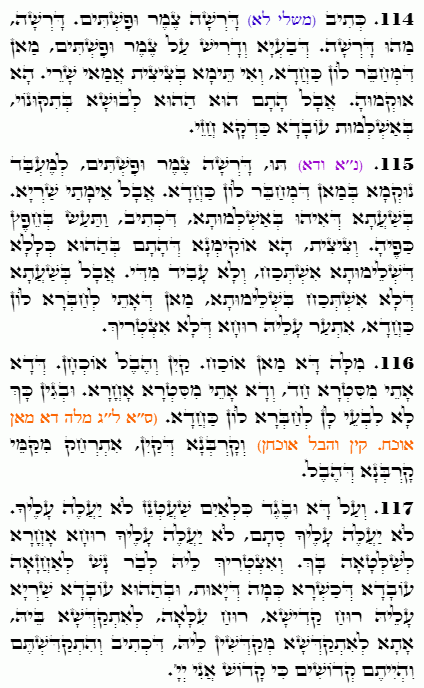Daily Zohar # 4612 – Kedoshim – She seeks wool and flax
Daily Zohar 4612

Hebrew translation:
115. (וְזֶה) עוֹד, דָּרְשָׁה צֶמֶר וּפִשְׁתִּים – לַעֲשׂוֹת נְקָמָה בְּמִי שֶׁמְּחַבֵּר אוֹתָם יַחַד. אֲבָל מָתַי שׁוֹרָה? בְּשָׁעָה שֶׁהוּא בִּשְׁלֵמוּת, שֶׁכָּתוּב וַתַּעַשׂ בְּחֵפֶץ כַּפֶּיהָ. וְצִיצִית, הֲרֵי בֵּאַרְנוּ שֶׁשָּׁם בְּאוֹתוֹ הַכְּלָל שֶׁל הַשְּׁלֵמוּת נִמְצָא, וְלֹא עוֹשֶׂה דָבָר. אֲבָל בְּשָׁעָה שֶׁלֹּא נִמְצָא בִשְׁלֵמוּת, מִי שֶׁבָּא לְחַבְּרָם יַחַד, מְעוֹרֵר עָלָיו רוּחַ שֶׁאֵינָהּ צְרִיכָה.
116. מִי מוֹכִיחַ דָּבָר זֶה? קַיִן וְהֶבֶל מוֹכִיחִים, שֶׁזֶּה בָּא מִצַּד אֶחָד, וְזֶה בָּא מִצַּד אַחֵר, וּמִשּׁוּם כָּךְ אֵינֶנּוּ צְרִיכִים לְחַבְּרָם יַחַד. (מִי מוֹכִיחַ דָּבָר זֶה? קַיִן וְהֶבֶל מוֹכִיחִים) וְקָרְבָּנוֹ שֶׁל קַיִן הִתְרַחֵק מִלִּפְנֵי קָרְבָּנוֹ שֶׁל הֶבֶל.
117. וְעַל כֵּן, וּבֶגֶד כִּלְאַיִם שַׁעַטְנֵז לֹא יַעֲלֶה עָלֶיךָ. לֹא יַעֲלֶה עָלֶיךָ סְתָם, לֹא יַעֲלֶה עָלֶיךָ רוּחַ אַחֶרֶת לִשְׁלֹט בְּךָ. וְצָרִיךְ לוֹ לָאָדָם לְהַרְאוֹת מַעֲשֶׂה כָּשֵׁר כְּמוֹ שֶׁרָאוּי, וּבְאוֹתוֹ מַעֲשֶׂה שׁוֹרָה עָלָיו רוּחַ קְדוֹשָׁה, רוּחַ עֶלְיוֹנָה, לְהִתְקַדֵּשׁ בּוֹ. בָּא לְהִתְקַדֵּשׁ – מְקַדְּשִׁים אוֹתוֹ, שֶׁכָּתוּב וְהִתְקַדִּשְׁתֶּם וִהְיִיתֶם קְדֹשִׁים כִּי קָדוֹשׁ אֲנִי ה’.
.
Zohar Kedoshim
Continued from previous DZ
#114
Proverbs 31:13
“דָּרְשָׁה צֶמֶר וּפִשְׁתִּים וַתַּעַשׂ בְּחֵפֶץ כַּפֶּיהָ.”
“She seeks wool and flax And willingly works with her hands.”
He asks, “דָּרְשָׁה” “seek” “what is Seek?” He answers that the Shechina, called the “woman of valor,” seeks and asks about wool and linen and whoever joins them together to punish him. And if you say, why is it permitted to have “שעטנז” “Shaatnez” (a mixture of wool and linen) in tzitzit? And he answers, it has already been explained. But there, the garment is according to its proper correction, that is, according to its mitzvah, in the completeness of the act as it should be. In other words, because the mitzvah is thus, it is not considered a crooked act.
Notes:
The Shechinah, represented as the “woman of valor,” actively seeks out and demands accountability for the mixing of wool and linen, highlighting the importance of adhering to this Mitzva.
Despite the general prohibition of “שעטנז” Shaatnez, there is an exception when it comes to the mitzvah of tzitzit. This exception is grounded in the principle that when a garment is worn in accordance with the mitzvah, it is considered in its proper and complete form.
#115
Additionally, it can be interpreted that the “דָּרְשָׁה” “seek” regarding wool and linen refers to exacting retribution upon one who joins them together. However, when holiness dwells within them, it is when the act is complete, as it is written, “וַתַּעַשׂ בְּחֵפֶץ כַּפֶּיהָ” “And she works willingly with her hands.” Regarding tzitzit, we have explained that the “שעטנז” Shaatnez is included within the general completeness, and it does not bring upon it the judgment from the Other Side (Sitra Achra). Therefore, it is permitted, as it is written, “וַתַּעַשׂ בְּחֵפֶץ כַּפֶּיהָ” “And she works willingly with her hands.” But when the act is not complete, anyone who attempts to join wool and linen together, a spirit that should not be invoked, meaning the Sitra Achra, is aroused upon him.
#116
This matter is proven by Cain and Abel, who demonstrate this principle. Abel came from the side of holiness, while Cain came from the side of the Other Side. Therefore, they should not be joined together. When both brought their offerings,
“Cain brought some of the fruit of the soil (linen) as an offering to YHVH” (Genesis 4:3)
“Abel also brought of the firstborn of his flock and of their fat. And YHVH respected Abel and his offering:”
Their offerings were different and did not unite; rather, Cain’s offering was distanced because of Abel’s offering.
Notes:
Cain and Abel’s offerings illustrate the broader principle of keeping holy and unholy elements separate, reinforcing the discussion about not mixing wool and linen.
Just as Cain and Abel’s offerings could not unite, the mixing of wool and linen, representing different spiritual levels, should be avoided unless it is under specific circumstances that ensure purity and holiness, such as in the mitzvah of tzitzit.
#117
Leviticus 19:19
“אֶת חֻקֹּתַי תִּשְׁמֹרוּ בְּהֶמְתְּךָ לֹא תַרְבִּיעַ כִּלְאַיִם שָׂדְךָ לֹא תִזְרַע כִּלְאָיִם וּבֶגֶד כִּלְאַיִם שַׁעַטְנֵז לֹא יַעֲלֶה עָלֶיךָ.”
“‘You shall keep My statutes. You shall not let your livestock breed with another kind. You shall not sow your field with mixed seed. Nor shall a garment of mixed linen and wool come upon you.”
Therefore, “And a garment of mixed species, Shaatnez, shall not come upon you” indicates broadly that a foreign spirit should not dominate you. A person must show proper and fitting actions, and through such actions, a holy and exalted spirit will dwell upon them to sanctify them. As it is said, “וְהִתְקַדִּשְׁתֶּם וִהְיִיתֶם קְדֹשִׁים כִּי קָדוֹשׁ אֲנִי ה” “Sanctify yourselves and be holy, for I am holy” (Leviticus 11:44).
Notes:
The prohibition against wearing Shaatnez applies to physical garments as well as to prevent any foreign or impure spirit from dominating a person. This extends the principle from the physical to the spiritual realm.
When a person strives to purify themselves, they are assisted from above. This is reflected in the principle “בא לטהר מקדשים אותו One who comes to purify is assisted from above,” which is supported by the mitzvah to sanctify oneself because God is holy.
Spiritual purity draws protection from negative influences.
{||}

 Previous: Kedoshim
Previous: Kedoshim

